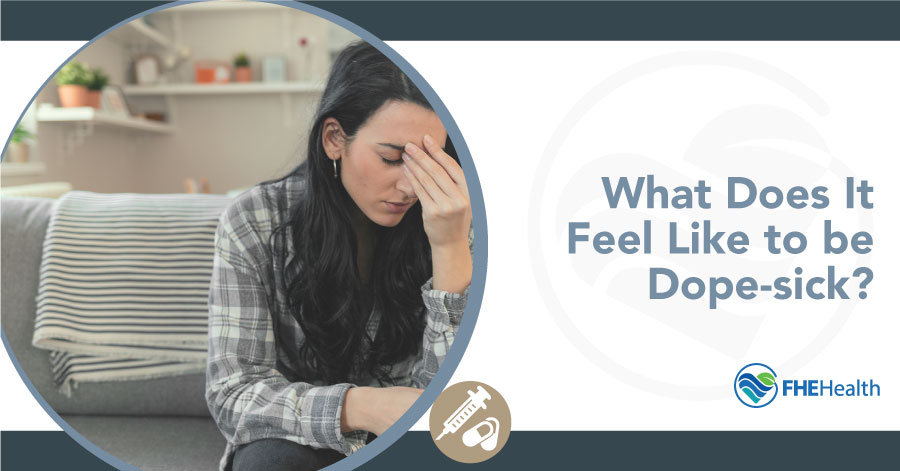
Most people who suffer from substance abuse issues understand that detox and withdrawal come with some unpleasant side effects, but for heroin and opiates, it takes another form. Even those who have never tried to get sober hear the stories from friends and other users of being “dope sick,” and fear of this feeling can be a major barrier to taking steps to get clean. People stay on heroin because they don’t want to have dope sickness, despite the fact that there are clinical resources available to help people get off heroin and other opiates without experiencing the harsh sickness they would if they tried to quit cold turkey.
In this piece, we’ll talk about dope sickness — what it means to be dope sick, why it can be such a roadblock for people trying to reach recovery and some ways to prevent or lessen it, increasing the odds of successfully getting sober.
What Is Dope Sickness?
Dope sickness is something many people addicted to heroin and other opiates — like fentanyl and prescription pain medications — fear. Dope sickness is, essentially, another term for opiate withdrawal. It signals the body’s reaction to not having access to the chemicals on which it has become dependent. It’s also said to be extremely unpleasant, with severe symptoms that last anywhere from several days to a few weeks.
Because of this, dope sickness has become a legendary concept for people abusing opiates and often a barrier to getting clean, because addicts remember how unpleasant it is to be dope sick. Because of the many stories from addicts going through it, even those who have never experienced it understand what it means to be dope sick and take the necessary steps to avoid the feeling.
Why Does Heroin Make You Dope Sick?
Because dope sickness is an accompanying factor to heroin withdrawal, it functions in the same way as many periods of withdrawal. When a person habitually abuses opiates, the active molecules in the drug bind to opioid receptors in the brain that prompt the release of dopamine, a natural chemical that controls feelings of happiness, pleasure and euphoria. Over time, the brain becomes dependent on the presence of these chemicals and the substances that help create them.
Withdrawal symptoms occur when these substances are suddenly no longer accessible in the brain. The brain provides negative feedback to this absence, which, in the case of heroin, causes severe issues and discomfort throughout the body. Dope sickness describes the harsh physical symptoms of withdrawal from opiates.
What Are the Signs and Symptoms of Dope Sickness?
Most people who have experienced dope sickness say that it starts with a range of minor but extremely foreboding sensations: fatigue, runny nose and other cold-like symptoms, mild soreness, sensitive skin, tingling or restless legs. In just a few hours, these symptoms can morph into full-blown heroin withdrawal.
The symptoms of dope sickness include:
- Yawning and fatigue
- Physical weakness
- Fever, chills and extreme sweating
- Lacrimation (heavy tear production)
- Runny nose
- Anxiety and depression
- Restlessness and insomnia
- Dilated pupils
- Tachycardia (increased heart rate)
- Hypertension (increased blood pressure)
- Nausea/vomiting
- Abdominal pains
- Diarrhea
- Severe muscle aches
- Agitation and hyper-awareness
Taken by themselves, many of these symptoms are looked at as minor, but during sickness, a person undergoing withdrawal can experience some or all of these at once, at a high level of severity. At best, this is an extremely unpleasant experience, and at worst, it can be dangerous — even fatal. There have been cases where excessive diarrhea and vomiting have caused severe dehydration, and sustained elevations in blood pressure and heart rate can lead to heart failure.
For many, it takes only a few hours of sobriety before dope sickness sets in. The first 3-4 days tend to be the most unpleasant, and many addicts report a peak in dope sickness around the third or fourth day. After that, symptoms start to tail off, but they usually last the next few days and sometimes as long as a few weeks after the peak. Unfortunately, many people don’t make it past the first few days, deciding to relapse rather than continue to feel sick.






